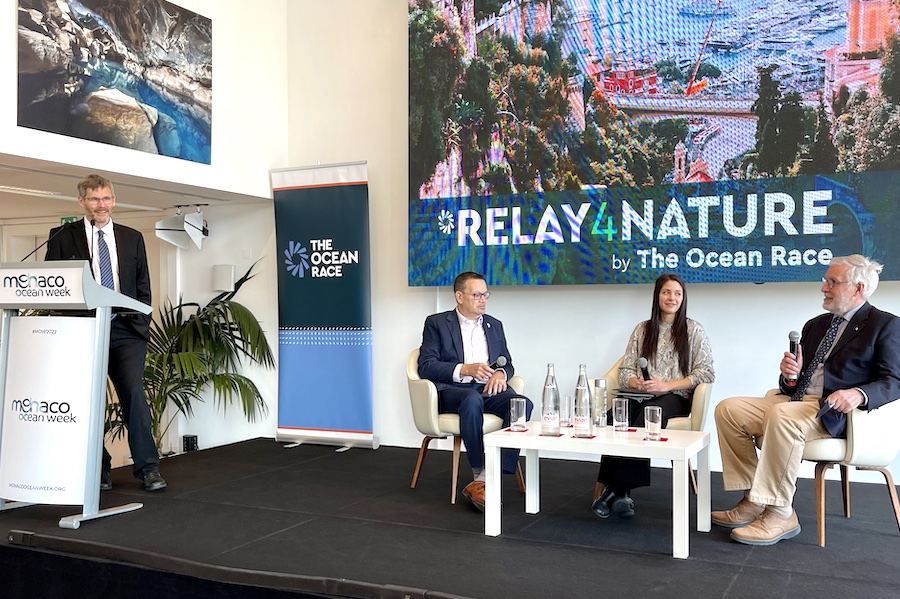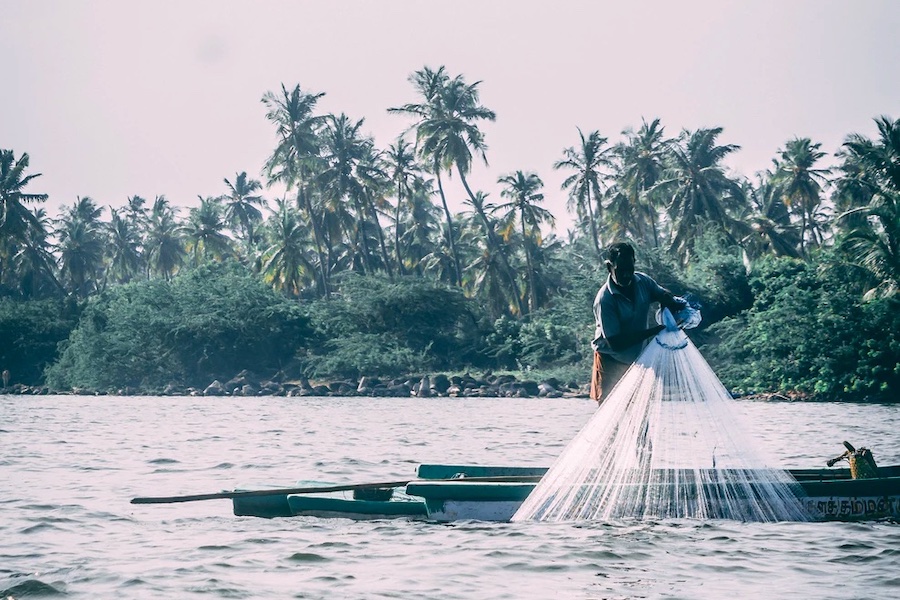Efforts are underway to create a Declaration of Ocean Rights, similar to the concept of Human Rights and the Rights of Nature, giving the ocean legal status and the fundamental right to be protected. Michelle Bender, Founder of the Ocean Rights framework, tells us exactly how the declaration will work.
It was during Monaco Ocean Week, on Thursday 24th March at the Yacht Club of Monaco, that Relay4Nature was held, organised by the Ocean Race.
The issue on the table: Why do we need to give the ocean legal rights, and what does a Declaration of Ocean Rights actually look like?
“We have to talk about rights because of the way our western system is constructed,” says Michelle Bender, founder and creator of the Ocean Rights framework. “It’s a rights-based system and, unfortunately, if something is rightless, it is an object, a resource, property or utility. We have to shift how we value and treat nature, and rights is one way to do that.”
Bender is an environmental law and policy specialist at the Earth Law Centre in America. She also serves on the Executive Committee for the Global Alliance for the Rights of Nature, a network of organisations and individuals committed to advancing this new paradigm internationally.
According to the Rights of Nature doctrine, an ecosystem is entitled to legal personhood status and, as such, has the right to defend itself in a court of law against harms, including environmental degradation caused by a specific development project or even by climate change.
The Rights of Nature framework recognises that an ecosystem has the right to exist, flourish, regenerate its vital cycles, and naturally evolve without human-caused disruption. Furthermore, when an ecosystem is declared a “subject of rights”, it has the right to legal representation by a guardian who will act on their behalf and in their best interest.
“We are really building upon a global momentum,” says Bender. “Rights of Nature is now in over 20 countries in some shape or form – at the global level, as well as the national, constitutional, and even parts of the judicial level. It’s this understanding that human wellbeing and human rights are embedded within and dependent upon nature – the air, clean water, jobs, our livelihoods. Rights of Nature is about recognising this reality in the legal system.”

Michelle Bender points to Ecuador, which in 2008 became the first country in the world to recognise the Rights of Nature in its constitution, and the right of its citizens to defend and protect nature.
“We are learning a lot from Ecuador because it has been over a decade since the Rights of Nature were included in its constitution. To be honest, there are some challenges with implementing this, as we see with the Universal Declaration of Human Rights. We have these aspirations, but in order to put them into practice, we have to look at how we can implement their enforcement within national policies, the judicial system… Ecuador is showing us how we can construct these standards of decision making and principals for governance.”
Bender gives an example of the precautionary principle, which she says is a staple of environmental law. “Within Ecuador’s environmental code, they have evolved this principle to ‘in dubio pro natura’, from ‘When in doubt, err on the side of caution’, to ‘When in doubt, err on the side of nature’. It’s an evolution of the principle, saying that, in the absence of scientific certainty, we have to take preventative and restrictive measures.”
The second issue to consider is the standards: What is a healthy ocean? What is significant adverse harm? “We have to look at how to define what a healthy ocean is, based upon what the ocean needs to be healthy. It must be able to restore and have integrity.”
Finally, says Bender, the ocean needs to be given a voice and a seat at the table. “More than 20 ecosystems have already been taken out of normal property and designated as legal entities subject to rights,” says Bender. “Much of this has been in Colombia – the rivers, national parks, and the Colombian Amazon, but also in New Zealand – the Whanganui River, and the Ganga and Yamuna rivers in India.”
The New Zealand case is unique because the Parliament finalised the Te Awa Tupua Act, appointing two guardians of the river: one representative of the Maori Indigenous people and one representative of the government, arguably reconciling two different worldviews.
By giving the ocean a voice, it creates new management bonds; it becomes the duty of its representatives to have respect for the intrinsic value of an ecosystem, and also to speak on behalf of that ecosystem’s interests and needs. “If we’re talking about equity for all stakeholders, representation of all to shape the future, the ocean needs to be one of those stakeholders,” says Bender.
Creating a Declaration of Ocean Rights
Using New Zealand as an example, Bender says the first step is the establishment of a scientific and technical body to review the decisions and impact assessments, and help decide what activity to allow, to what extent, and how to protect areas beyond national jurisdiction.
Indigenous peoples, small island states, and local communities who are on the frontline of the climate crisis, must be included in this group, she adds.
“The concept of ocean rights and rights of nature is something that they understand deeply,” says Bender. “They have a strong relationship with the ocean, it is a source of life for them, it is an ancestor. They have customs and customary law that recognises their responsibility to be stewards and custodians of the ocean, and this has helped guide local governance of human activity in more of a reciprocal and harmonious manner. We can learn a lot from them, but we must do it in a very ethical way, being careful not to appropriate the knowledge.”

She adds, “We are really likening it to the Universal Declaration of Human Rights or the Universal Declaration of Indigenous Peoples because we have these first and foremost rights, but they are also aspirations and understandings. Focussing on rights is really about what our values are and the shifting of our core values. One way to look at that is in principles – what principles are we going to have for governance that will hold us accountable?”
Granting the ocean legal rights might help arm it against injury under the law, but how does that translate into reality? Giving legal status to ecosystems has so far been mostly symbolic, and the success of a lawsuit is largely based on how a case is framed and the interests of the claimants. But as the number of lawsuits grows, a precedent will hopefully be set for national and local governments to act on biodiversity conservation by opposing projects that might prove destructive to a particular ecosystem.
What about the Law of the Sea?
The ocean is not completely unprotected from a legal standpoint. There exists the Convention on the Law of the Sea (UNCLOS), signed in 1982 by 117 States and entered into force in 1994. However, it is restricted to the geographic jurisdictions of coastal States and the rights and duties among those States in the use and conservation of the ocean environment and its natural resources.
According Michelle Bender, UNCLOS is an outdated reference that focuses on state sovereignty, the right to exploit, and freedom of the seas.
“Article 192 creates the obligation for States to protect and preserve the marine environment, but there is no framework to implement or enforce this provision, nor really hold States accountable, especially in areas beyond national jurisdiction. The negotiations to agree on a treaty to protect biodiversity on the high seas are underway and is going in the right direction, but we still see our effort as different.”
Monaco is part of this alternative push for a new treaty on the high seas. As a member of the intergovernmental conference, it contributed to the fourth and final session this month, finalising details for an international legally binding agreement for the conservation and sustainable use of marine areas beyond national jurisdiction (BBNJ).
Still, Michelle Bender sees the Declaration of Ocean Rights as a completely separate, and fundamentally essential, set of rules.
“A Universal Declaration of Ocean Rights would create a new overarching framework rather than be integrated into existing agreements like UNCLOS,” she explains. “Earth-centred governance places human society within natural systems. It would create a fundamental change in the values and ethics that underlie our legal, governance and economic systems. In this process, we are asking ourselves what the ocean needs to be thriving and healthy, and how we can better manage human activity in a reciprocal and ecologically sustainable way.”
The next steps
In order to define the principles of the Declaration of Ocean Rights, a series of innovation workshops are being held, gathering together stakeholders and representatives, including lawyers and scientists, but also community members, indigenous peoples, government members and officials, those who are actively involved in ocean conservation. The aim is for the principles to be agreed upon by September 2023.
Then, the declaration must be ratified by States at the UN level, ideally no later than 2030. It is the year when, hopefully, a campaign to protect 30% of the oceans comes to fruition. Currently, only 2.7% of the world’s oceans are completely protected from commercial fishing, mining, oil drilling and other destructive activities.
Michelle Bender acknowledges that the implementation of the Declaration of Ocean Rights, its enforcement, and defining the commitment of individual States, will be the most difficult aspect: “Just like with human rights, it will probably take some time. But we must put the ocean at the centre of governance, and ask ourselves: how can we transform our relationship with nature?”
Discussions will continue at the United Nations Ocean Conference in Lisbon on 25th June.
Click on the video below…
https://www.instagram.com/p/Cbz4QKYDa7L/?utm_medium=copy_link
Photo by Janko Ferlič on Unsplash
